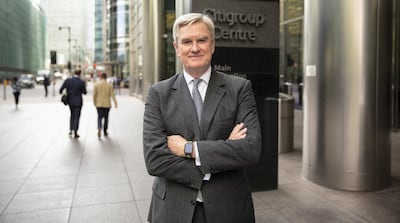Citigroup, the third-largest US bank, expects its Middle East and North Africa hub in the UAE, to maintain its five-year revenue growth track despite the global economic downturn induced by the pandemic, a senior executive said.
While all Citigroup businesses including payments, financing and private banking have contributed to growth over the past five years, investment banking will underpin an increase of revenue in 2020, David Livingstone, Citigroup's chief executive of Europe, the Middle East and Africa told The National in an interview.
“If you go back over the last five years, our growth in the UAE, but also more broadly in the region, is running at the high single-digit level at revenue line,” Mr Livingstone said. Growth in “2020 is not being dissimilar to the trend growth rates that we have had in the past”.
The bank's overall Mena business will also follow the same trend line, driven by the UAE, the Arab world's second-largest economy, and one of the strongest emerging markets within Citigroup’s EMEA division.
“The other dimension, which is very UAE-specific, is the continued development of the level of investment banking – M&A activity, financing activity – which has been generated domestically,” he said. “It certainly had a significant uptick during the course of 2020.”
Outside the UAE, the world’s top oil exporter Saudi Arabia is an attractive market for Citigroup. It currently operates in the kingdom through a capital markets licence that allows origination and investment banking services.
Mr Livingstone said the bank remains “very positive” on market opportunities but has yet to apply for a full commercial banking licence in the kingdom.
“We keep the rest of our arrangements under review in terms of the opportunities and the appropriateness of the increase in licences [in the kingdom],” he said.
With interest rates at historic lows, governments and companies are raising capital to shore up finances, which means business for the bank. Public and private sector firms have sought mergers and acquisitions to gains scale amid tougher operating conditions. That is a boon for investment banking, and offsets a slowdown in consumer lending and private banking.
Mena investment banking fees reached an estimated $895.7 million during the first nine months of 2020, up 4 per cent from the same period in 2019. It is the highest year-to-date total since 2008, according to financial data company Refinitiv.
Citigroup was the fifth-highest investment banking fee earner in the region after HSBC, First Abu Dhabi Bank, Standard Chartered and JP Morgan. It generated $49.4m of fees in the first nine months through 37 deals.
Looking ahead, Mr Livingstone believes sovereign debt issuance, acquisition financing and Sharia-compliant capital raising will underpin growth.
“Sovereign financing has increased everywhere, also within Mena … government balance sheets have grown and there are attractive financing opportunities,” he said.
Mr Livingstone, who is part of Citi’s global executive management team reporting to chief executive Michael Corbat, sees a global patchy economic recovery so far amid a rise in coronavirus cases, as governments try to maintain a balance between lives and livelihoods.
“I do think the resilience of economies and systems to cope with the passage of the virus has definitely increased during the course of this year,” he said, when asked if the worst for the global economy is over.
Within EMEA, the rise in Covid-19 cases in some of the biggest economies such as Germany, France, Spain and Italy means there is still more work to do in steering out of the crisis.
Part of Citi’s business is sensitive to interest rates and economic growth, and that “undoubtedly will have an impact”, he said.
“It is a challenge, but one which we think we would operate well in,” Mr Livingstone added. “We are a multi-asset class, multi-product and multi-geographic full-service wholesale bank and that position … is supported and not challenged by the conditions we have had in Covid this year."
Mr Livingstone, who oversees Citi’s business in more than 100 EMEA markets in half of which it maintains a physical presence, said the lender is prepared for a no-deal Brexit as the UK enters the final stretch of talks with Europe on a trade deal.
“We are prepared and we were prepared last March and last October, in part because it is a right operating assumption to make," he said.
Citi has already moved some of its leadership roles to Frankfurt and Dublin ahead of the outcome of the ongoing trade deal talks.
“The measure of preparedness is not just the number of roles,” he said, adding that the bank’s client activities post- Brexit, will have to be executed through EU-recognised and domiciled entities.
“Citi started somewhat with an advantage given we were already a European bank,” Mr Livingstone said. “We are ready to accommodate all that activity as required."



